 "No court that can try a dictator has ever come into existence in Pakistan," ousted Prime Minister Nawaz Sharif, himself sent packing by the Supreme Court, complained to a group of lawyers gathered at Punjab House, Islamabad on Tuesday (Jan 9).
"No court that can try a dictator has ever come into existence in Pakistan," ousted Prime Minister Nawaz Sharif, himself sent packing by the Supreme Court, complained to a group of lawyers gathered at Punjab House, Islamabad on Tuesday (Jan 9).
Claiming that that he had been ‘persecuted’ over the years and ‘pushed towards revolt’, Sharif drew parallels between what he considers to be his own 'cornering' by the state and the events that led to the secession of Bangladesh from Pakistan.
"Sheikh Mujibur Rehman (Former Bangladesh Prime Minister) was not a rebel, but was made into one," Sharif remarked, referring to the tragic consequences that followed the state's refusal to allow a popularly elected leader to hold the prime minister's office.
This is not the first time Sharif has invoked the spectre of 1971 ever since he was unceremoniously ousted from power by the Supreme Court's Panama gate decision.
But "I want to forget all these wounds," he remarked. "I don't want to take them to a point where my emotions get out of my control."
"What has been done to me, and to all the elected prime ministers in this country's history, is not correct," he continued. "What kind of return for service to the nation is this?"
Demanding an end to the usurpation of democratically-elected governments, he asked that those involved in behind-the-scenes manipulation of the political order "repent for their sins and ask for forgiveness from the nation." Returning to the secession of Bangladesh from Pakistan, the thrice-ousted prime minister said, "The Bengalis had a central role in the effort to create Pakistan, but we did not treat them well and separated them from us."
Returning to the secession of Bangladesh from Pakistan, the thrice-ousted prime minister said, "The Bengalis had a central role in the effort to create Pakistan, but we did not treat them well and separated them from us."
"The Justice Hamoodur Rehman Commission had published a very truthful and clear report on the creation of Bangladesh after a detailed analysis, but we did not even read it," Sharif lamented.
"Had we acted on it, today's Pakistan would have been different and the kinds of games that are being played would not have been played."
Sweeping past and incumbent judges together, Sharif accused the judiciary of complicity in weakening the democratic process, saying they had ‘legitimised dictatorships’ and ‘invented the doctrine of necessity.’
"They (the dictators) were told that had you not arrived, the country would have been destroyed. They were told that 'This is Pakistan's Constitution, and it is your property. They were given authority to amend the Constitution, an authority that the judges themselves did not have."
"They (dictators) were told 'We will never ask you, no one will ask you', and the nation kept quiet," Sharif said, conceding that the nation had collectively been at fault.
Source: DAWN


